Iranians find joy in serving pilgrims on road to Karbala
Volunteers have been staying in Mehran for nearly two weeks
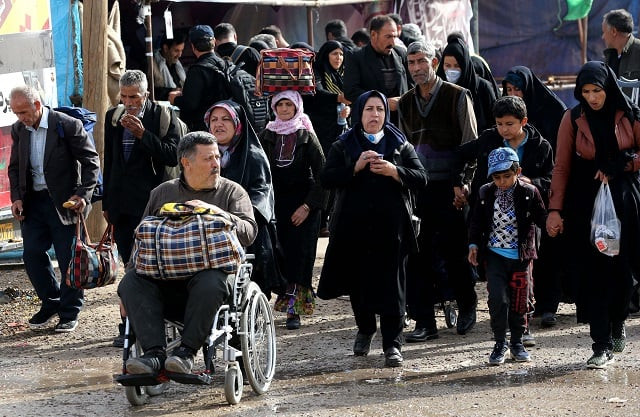
Iranian Shiite Muslims pilgrims walk at the Mehran border point between Iran and Iraq, as they head toward the central Iraqi shrine city of Karbala, on October 28, 2018, ahead of the Arbaeen religious festival. - Arbaeen, which marks the 40th day after Ashura, commemorates the seventh century killing of Prophet Mohammed's grandson Imam Hussein.
PHOTO: AFP
Farther down the road another cleric stands on a chair holding a Quran over the heads of passing crowds, blessing them as they march in the thousands towards the shrine of Imam Hussein in Karbala, central Iraq.
A tailor is also working diligently, sewing up torn clothes for free. And if anyone needs a money pouch, he can rustle one up from scratch in a matter of minutes.
Chehlum security: Over 14,000 cops deployed for guarding processions
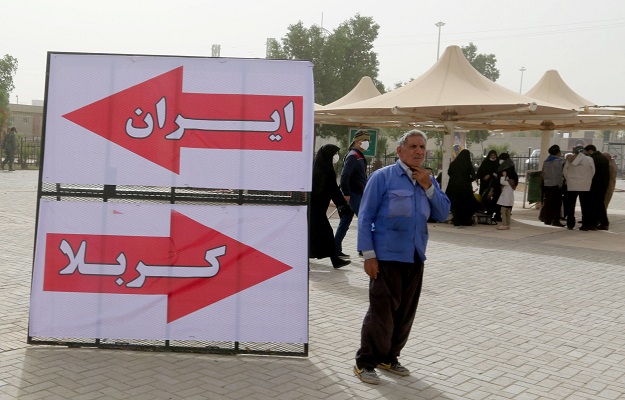 A man stands next to a sign that reads in Farsi and Arabic "Iran - Karbala" at the Mehran border point between Iran and Iraq, as thousands of Shiite Muslim Iranian pilgrims headed towards the central Iraqi shrine city of Karbala on October 27, 2018, ahead of the Arbaeen religious festival. - Arbaeen, which marks the 40th day after Ashura, commemorates the seventh century killing of the Prophet Mohammed's grandson Imam Hussein.PHOTO: AFP
A man stands next to a sign that reads in Farsi and Arabic "Iran - Karbala" at the Mehran border point between Iran and Iraq, as thousands of Shiite Muslim Iranian pilgrims headed towards the central Iraqi shrine city of Karbala on October 27, 2018, ahead of the Arbaeen religious festival. - Arbaeen, which marks the 40th day after Ashura, commemorates the seventh century killing of the Prophet Mohammed's grandson Imam Hussein.PHOTO: AFPThese volunteers have been staying in Mehran for nearly two weeks, offering their services to the pilgrims as they walk towards the crossing.
Some 1.8 million Iranians have been given Iraqi visas to make the pilgrimage to Karbala for the holy festival of Arbaeen this year - and many will pass on foot through the border point at Mehran.
Arbaeen, which this year falls on October 30, marks 40 days after the martyrdom in 680 of Imam Hussein, grandson of the Prophet
Mohammad who refused to accept the leadership of the 'usurper' Caliph Yazid and was massacred along with his followers at Karbala.
Most of the devout walk all or part of the way to the shrine, one of the holiest sites in Shia Islam.
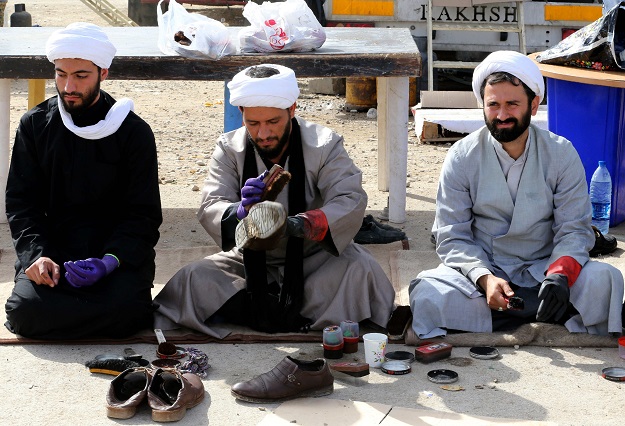 PHOTO: AFP
PHOTO: AFP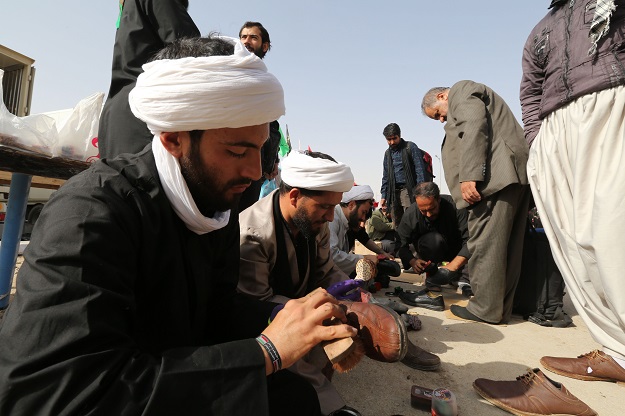 Iranian Shia Muslim pilgrims wave flags at the Mehran border point between Iran and Iraq, as they head toward the central Iraqi shrine city of Karbala, on October 28, 2018, ahead of the Arbaeen religious festival. - Arbaeen, which marks the 40th day after Ashura, commemorates the seventh century killing of Prophet Mohammed's grandson Imam Hussein.PHOTO: AFP
Iranian Shia Muslim pilgrims wave flags at the Mehran border point between Iran and Iraq, as they head toward the central Iraqi shrine city of Karbala, on October 28, 2018, ahead of the Arbaeen religious festival. - Arbaeen, which marks the 40th day after Ashura, commemorates the seventh century killing of Prophet Mohammed's grandson Imam Hussein.PHOTO: AFPBut some forego the march to the shrine, and instead stop in Mehran for days or weeks to serve the pilgrims.
For the many hundreds of devout volunteers who run 'mokebs' - tents that hand out free food and services - their work can feel even more sacred than the pilgrimage itself.
"There is no higher savab (divine reward) than to serve on the path of the Imam," says Mohsen Mohebbi, a cleric from the holy city of Qom, busy polishing shoes.
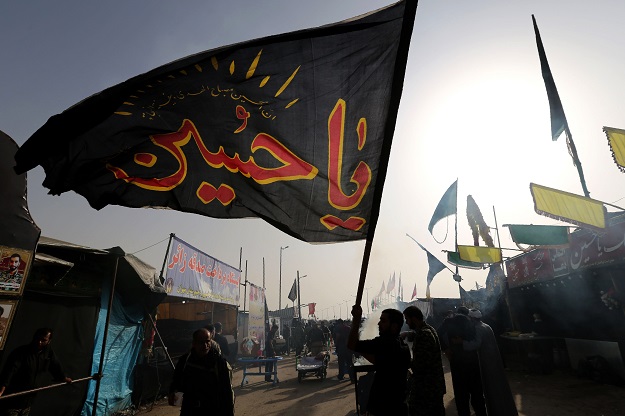 PHOTO: AFP
PHOTO: AFP"I mend torn clothes and backpacks, shorten chadors so that they don't become muddy on the road, and sew money pouches for the pilgrims," says Ali Nujuki, a 69-year-old retired tailor from Isfahan province who has been working here for two weeks with his wife and daughter.
"The joy of serving the pilgrims of Arbaeen is even greater than for the pilgrimage itself," he adds.
As well as huge numbers from Iran, many Shias are also passing through from neighbouring countries including Pakistan, Georgia and Azerbaijan.
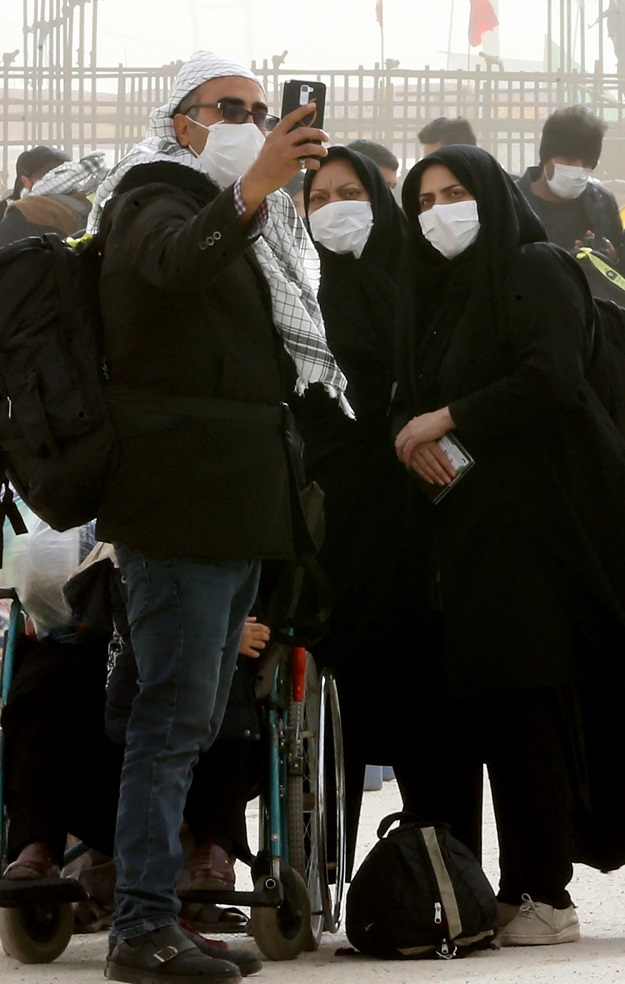 PHOTO: AFP
PHOTO: AFP"I don't care who is wearing the shoe I shine, what language they speak or what race they are," says Mohebbi.
"As long as they are marching towards Imam Hussein I will kiss their feet."
The march was forbidden for many years under former Iraqi dictator Saddam Hussein, who fought a devastating war with Iran in the 1980s. Restrictions were only lifted after his ouster in 2003.
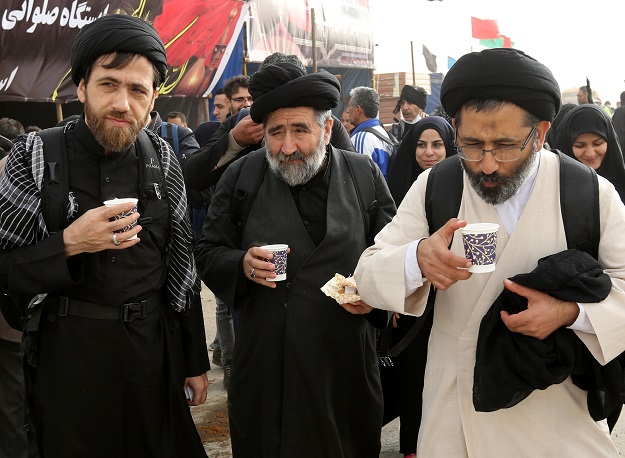 Iranian pilgrims have a hot drink as they prepare to cross the Mehran border point between Iran and Iraq, where thousands of Shiite Muslim believers were heading towards the central Iraqi shrine city of Karbala on October 27, 2018, ahead of the Arbaeen religious festival. - Arbaeen, which marks the 40th day after Ashura, commemorates the seventh century killing of the Prophet Mohammed's grandson Imam Hussein.PHOTO: AFP
Iranian pilgrims have a hot drink as they prepare to cross the Mehran border point between Iran and Iraq, where thousands of Shiite Muslim believers were heading towards the central Iraqi shrine city of Karbala on October 27, 2018, ahead of the Arbaeen religious festival. - Arbaeen, which marks the 40th day after Ashura, commemorates the seventh century killing of the Prophet Mohammed's grandson Imam Hussein.PHOTO: AFPWith the formation of a new Iraqi state, where the post of prime minister is held by a Shia, the march quickly became one of the most popular pilgrimages in the world.
Kiln worker famous for penning and reciting noha, marsia
"This is a march of unity and solidarity among Shia and Sunni, Persian and Arab, people from all strata and walks of life," says Mohammad Taghi Ganji, a 46-year-old cleric from Semnan province.
"The cursed Saddam closed the path (to Imam Hussein's shrine), but now look where he is, and Arbaeen is stronger than ever," adds Ganji, whose tent was staffed by volunteers from a local branch of Iran's Revolutionary Guards forces.
"Whenever enemies closed a door on us, Imam Hussein himself opened another path for us."



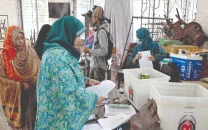















COMMENTS
Comments are moderated and generally will be posted if they are on-topic and not abusive.
For more information, please see our Comments FAQ